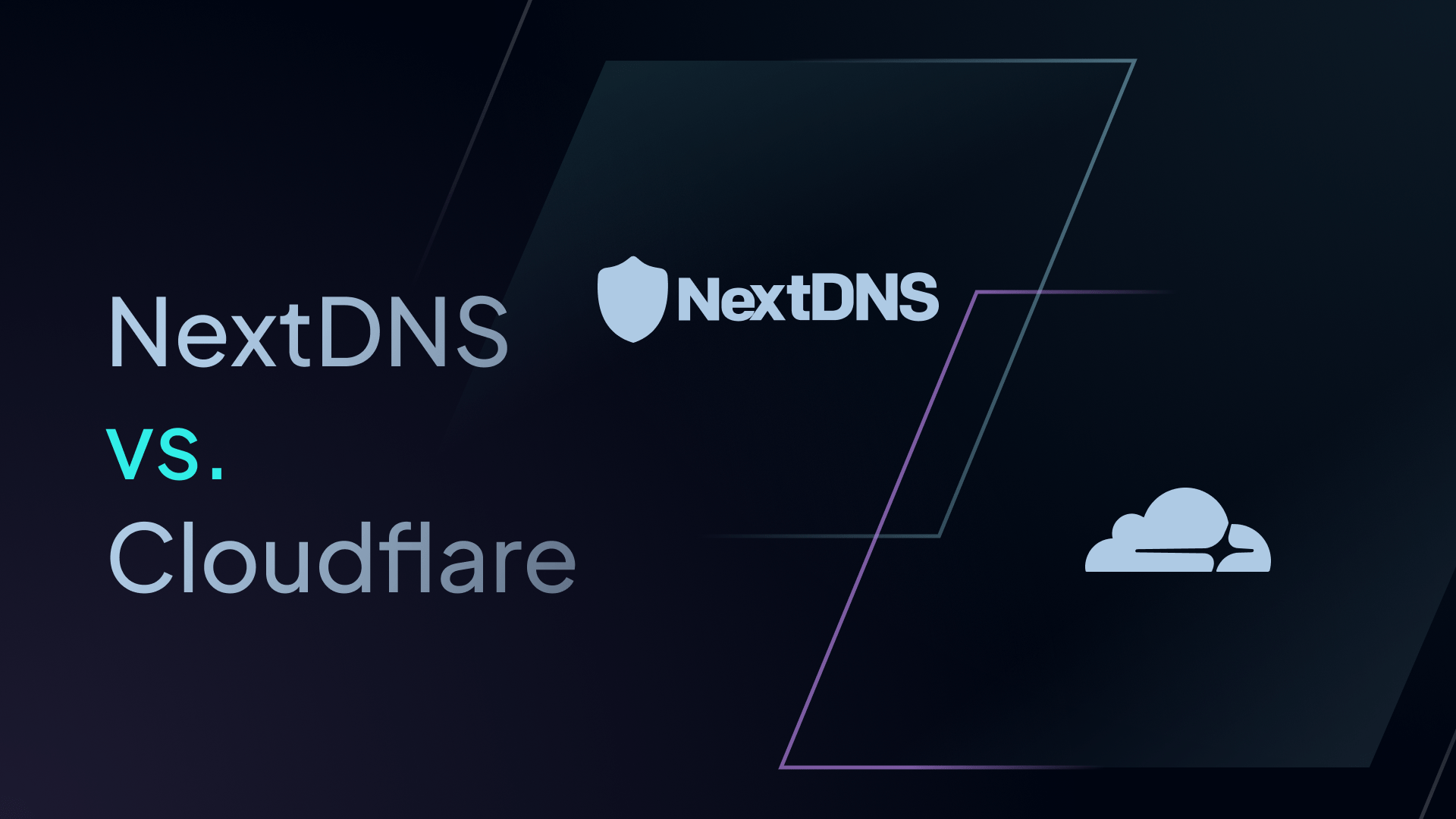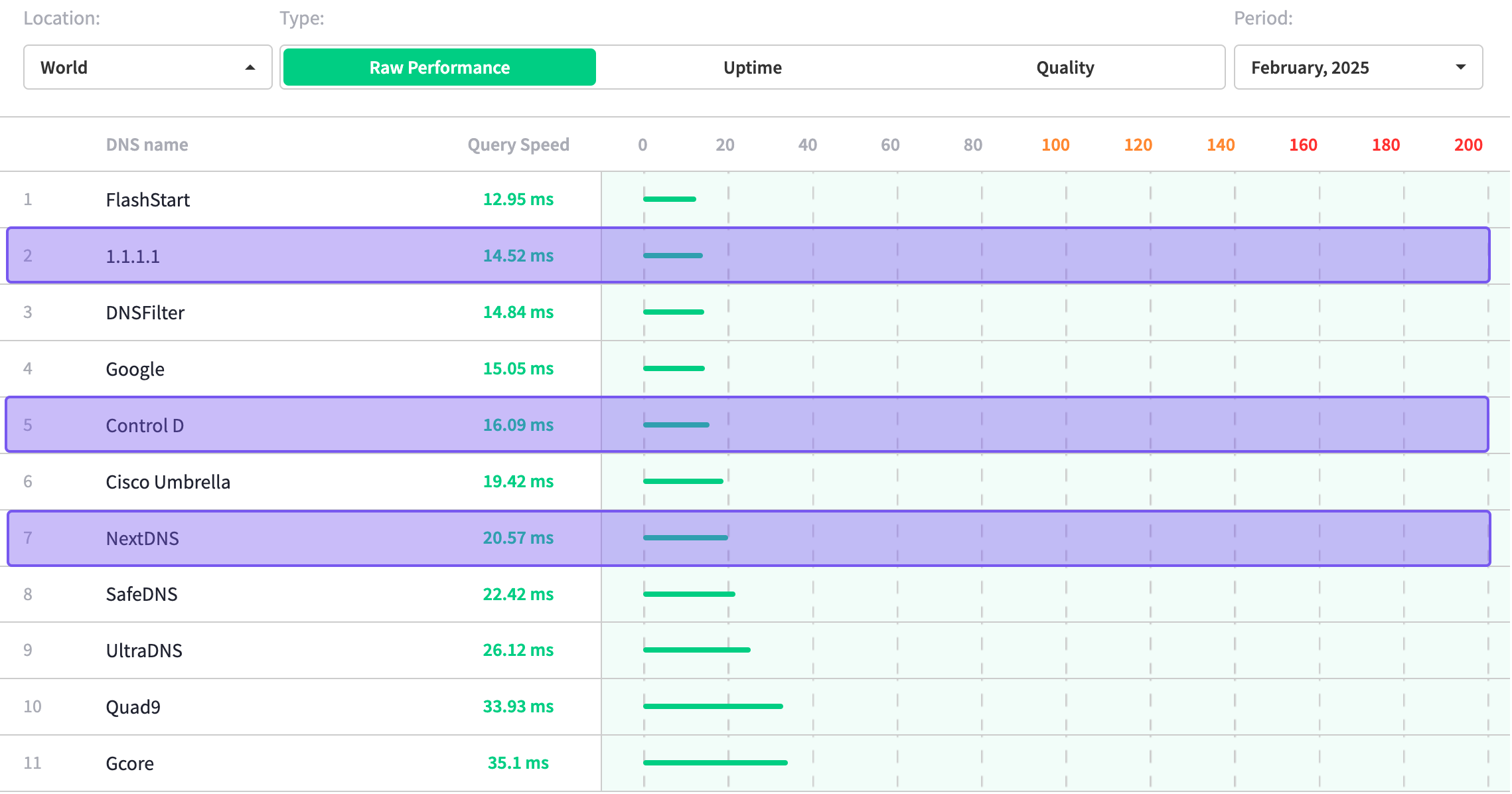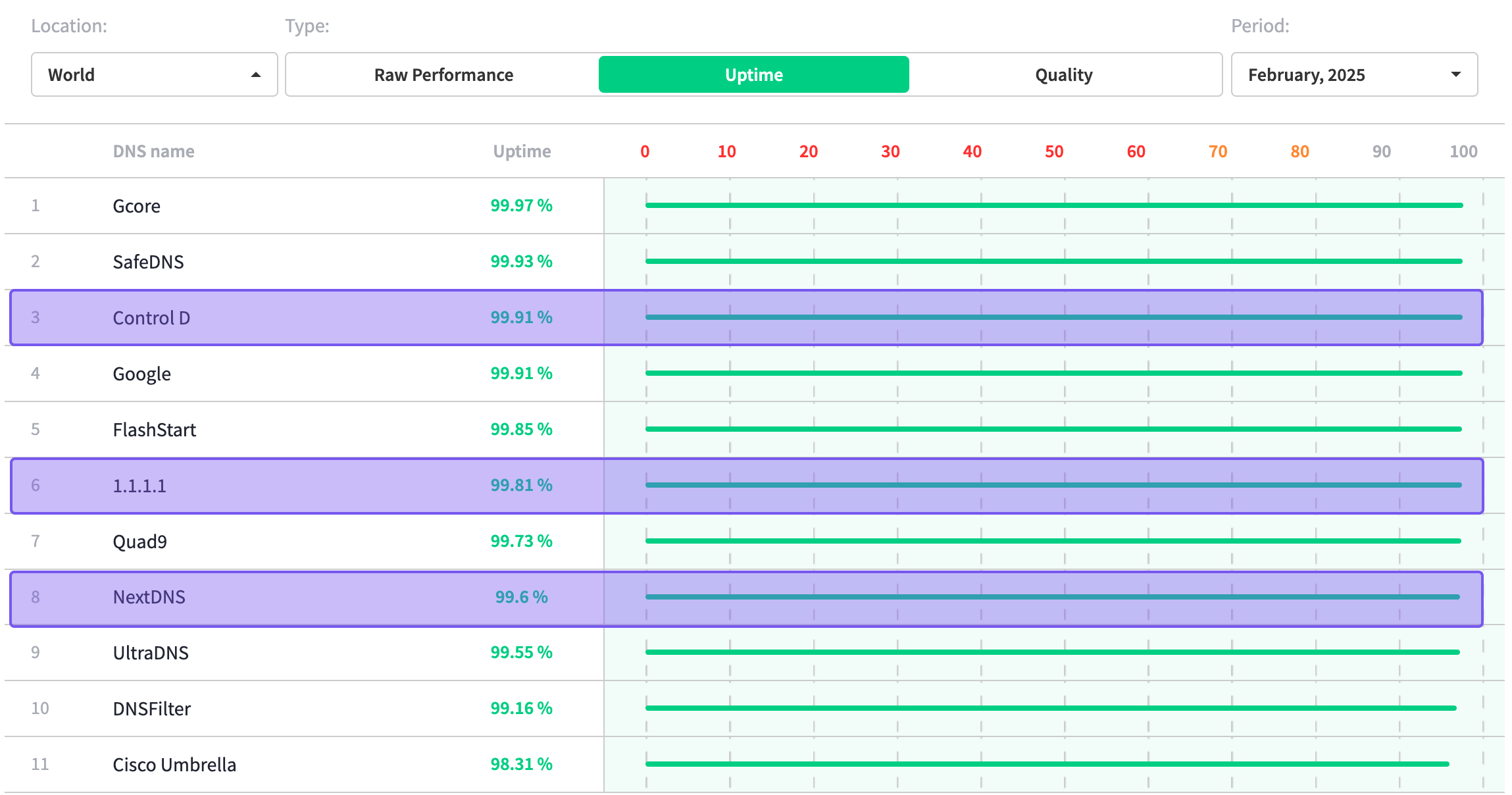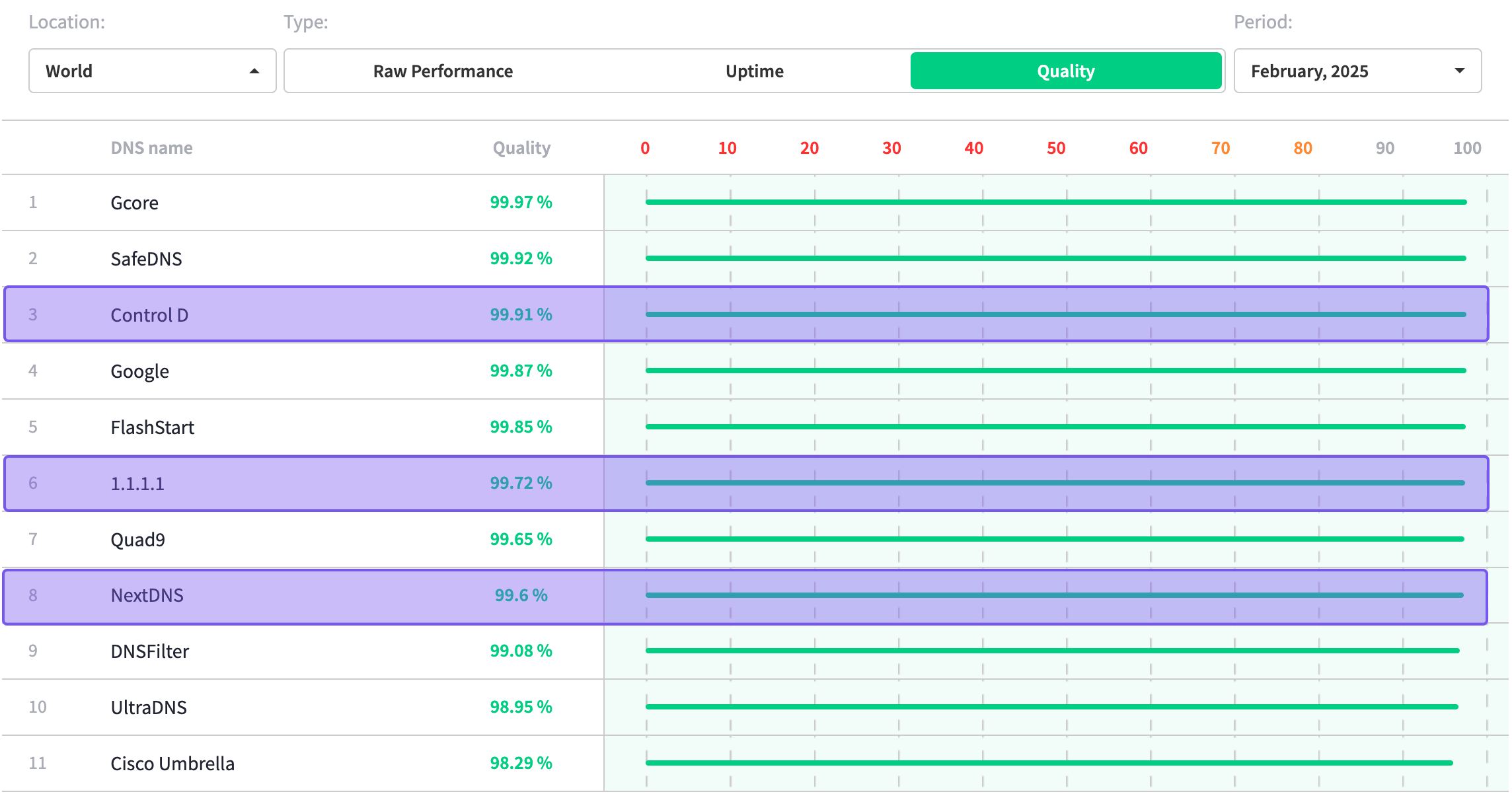NextDNS vs. Cloudflare: How Do They Compare?
A deep dive into features, pricing, support, analytics, and performance, plus a look at a third option that might beat them both.

The main difference between NextDNS and Cloudflare is that NextDNS offers more advanced privacy customization and parental controls, while Cloudflare emphasizes speed and global DNS performance. NextDNS logs can be disabled entirely, while Cloudflare’s 1.1.1.1 offers limited filtering features but faster response times globally.
This article compares the two services across features, pricing, analytics, support, and more to help you choose the best DNS filtering platform for your use case.
What are NextDNS and Cloudflare?
NextDNS is a DNS provider that focuses on user privacy and customizable filtering. It offers features such as ad-blocking, malware protection, parental controls, and analytics, allowing you to tailor your DNS experience according to your needs. It's primarily used by individuals and families, but also offers a business plan.
Cloudflare is a well-recognized name in the networking and security space. Its DNS service is built into Cloudflare Gateway. Primarily designed for large enterprises, the DNS product offers DNS filtering, malware protection, and additional features such as Remote Browser Isolation (RBI) and Data Loss Prevention (DLP).
NextDNS: Pros and Cons
Best for: Personal users and families looking for protection on home networks and devices.
Key Features
- Allows you to block ads, trackers, malicious websites, and adult content with a high degree of customization to suit personal or family needs
- Strong protection against malware, phishing attempts, and DNS-based attacks, with DNS over HTTPS (DoH) and DNS over TLS (DoT) for secure browsing
- Real-time logs and analytics for a comprehensive overview of your network activity
Pros:
- You can fine-tune settings for specific needs
- Stores query logs for up to two years
- Works across all major device types and operating systems
Cons:
- Configuring NextDNS can be a bit complex, especially when setting up custom lists
- The free plan has limitations on the number of queries and support
- Some users may experience slower DNS resolution speeds compared to other providers
- Lacks advanced features and integrations
Our Take on NextDNS
NextDNS offers a range of features tailored to enhance network security and productivity. These include customizable content filtering to block ads, malware, and inappropriate content, as well as the ability to monitor and control web activity across multiple devices and users.
However, it lacks some of the advanced features and integrations required for business use cases.
Cloudflare Gateway: Pros and Cons
Best for: Large enterprises looking for a bundle of corporate web security services.
Key Features
- One of the fastest DNS resolution speeds on the market
- Enterprise-level features such as RBI, DLP, and Secure Web Gateway (SWG)
- Integrates with zero-trust security models
Pros
- Built for speed, significantly improving DNS query resolution times, resulting in faster browsing and a better online experience.
- Easy to scale and doesn’t require on-premises hardware
- Seamless integration with Cloudflare's ecosystem
Cons
- Doesn’t offer as much granular control over specific security policies compared to other, more customizable solutions
- Some key analytics features require upgrading to a higher plan
- One of the more expensive DNS management platforms
- Poor customer support and lacklustre malware protection
Our Take on Cloudflare
Cloudflare Gateway’s DNS service is built into a broader security framework, providing a unified defense against online threats. It benefits from Cloudflare’s global infrastructure, ensuring low-latency and high-performance DNS responses for users across the globe.
However, it’s built for large enterprises and, therefore, comes with a hefty price tag. It also lags behind competitors for malware protection and post-sales customer support.
NextDNS vs. Cloudflare
Plans & Pricing
NextDNS offers several pricing plans:
- Free Plan: 300,000 queries per month, unlimited devices, full feature access, and community support
- Pro Plan: $1.99/month or $19.90/year. Includes unlimited queries, devices, and configurations with community support
- Business Plan: $19.90/month or $199/year for small and medium businesses, offering email support
- Education Plan: $19.90/month or $199/year for schools and universities, also with email support
Cloudflare Gateway is a corporate service with three plans:
- Free Plan: Provided for companies with fewer than 50 seats (only has 24-hour log retention)
- Pay-As-You-Go: $7/user/month for businesses with more than 50 seats
- Contract Plan: Undisclosed, custom pricing (requires speaking to a sales rep)
Features, Clients, and Integrations
| General Features | Cloudflare | NextDNS |
|---|---|---|
| Basic Malware & Phishing Protection | ✅ | ✅ |
| Advanced ML Based Malware Protection | ✅ | ✅ (beta) |
| Flexible Content Blocking | ✅ | Limited (7) |
| Blockable Services | ✅ (200+) | Limited (43) |
| Geo-Custom Rules | Geo-IP blocking only | ❌ |
| Modern DNS Protocols | ✅ | ✅ |
| Traffic Redirection | ❌ | ❌ |
| Blocks Ads & Trackers | ❌ | ✅ |
| Support for Desktop & Mobile Devices | ✅ | ✅ |
| Remote Browser Isolation | ✅ | ❌ |
| Data Loss Prevention | ✅ | ❌ |
| Secure Web Gateway | ✅ | ❌ |
| Single Sign-on (SSO) | ✅ | ❌ |
| RMM Integration | ✅ | ❌ |
Both NextDNS and Cloudflare DNS offer strong security and privacy-focused DNS services, but they differ in the depth of customization and additional features.
- NextDNS: Provides customizable content filtering, ad-blocking, malware protection, detailed analytics, and parental controls. Additionally, NextDNS supports DNS over HTTPS (DoH) and DNS over TLS (DoT) for enhanced security.
- Cloudflare: Cloudflare DNS emphasizes fast DNS resolution. It also supports DoH and DoT, ensuring secure and encrypted connections. However, Cloudflare lacks extensive content filtering or advanced analytics, focusing more on speed and simple security.
An important thing to note is that there are various reports online of NextDNS being an “abandoned” product, with users complaining that they feel like recent active development of the product has been “non-existent”.
Clients & Integrations:
- NextDNS: Supports multiple devices, including routers, smartphones, tablets, and computers, but does not support Single Sign-On (SSO) or RMM tools.
- Cloudflare: Supports protection for all types of endpoints, including desktops, laptops, smartphones, and tablets, as well as SSO, RMM tool, and Active Directory integration.
Analytics
| Analytics & Reporting | Cloudflare | NextDNS |
|---|---|---|
| Admin Action Logs | ✅ | ❌ |
| Full Query Logging | ✅ | ✅ |
| Query Log Retention | Up to 6 months (depends on plan) | Up to 2 years |
| Query Log Export | ✅ | ✅ |
| Report Retention | Up to 6 months (depends on plan) | ❌ |
| Analytics Retention | Up to 6 months | Up to 3 months |
| Data Export | Some plans | ✅ |
| SIEM Log Streaming | Some plans | ❌ |
| Per-user Reporting | Some plans | ✅ |
| Data Storage Regions | NA/EU | NA/EU/CH |
| Custom Storage Regions | ❌ | ❌ |
NextDNS Analytics:
- Logs and Insights: NextDNS provides up to 2 years' worth of query log data, allowing you to track every website visited.
- Real-Time Reporting: Real-time analytics that lets you monitor network traffic as it happens. This feature is useful for spotting suspicious activity or identifying potential security threats immediately.
- SIEM Log Streaming: NextDNS does not support SIEM log streaming.
Cloudflare Analytics:
- Real-Time Threat Monitoring: Provides live visibility into network traffic, including insights on DNS queries and web traffic. It helps identify and respond to threats immediately.
- Detailed Reporting: Generates reports on web activity, DNS queries, blocked threats, and user behaviors. These reports help organizations analyze trends, track potential risks, and ensure compliance with internal security policies.
- User and Group Activity Monitoring: Enables administrators to track user and group activity across the network. This includes monitoring which users accessed specific sites or resources, providing visibility into potential threats.
Support
| Support | Cloudflare | NextDNS |
|---|---|---|
| Community Support | ✅ | ✅ |
| Docs/Knowledge Base | ✅ | ✅ (limited) |
| Email Support | ✅ | ✅ |
| Prioritized Case Handling | Some plans | ❌ |
NextDNS Support:
- Email Support (Pro and Business Plans): NextDNS offers email support for users on its Pro and Business plans, providing assistance with setup, troubleshooting, and configuration.
- Community Support (Free Plan): For users on the free plan, NextDNS relies primarily on community support. There is a community forum where users can ask questions, share experiences, and get help from fellow users and the NextDNS team.
- Documentation: NextDNS provides documentation that guides users through setup and features, but it isn’t very thorough. As such, you may have to talk to a customer support rep or ask in community forums more often than you’d like.
However, it’s crucial to note that it’s not uncommon to see complaints on their community forum and other platforms about not receiving replies.
Cloudflare Support:
- Community Forum and Knowledge Base: Cloudflare has an extensive knowledge base and community forum where users can find helpful articles, guides, and solutions to problems. These are the only support channels available to Free plan subscribers.
- Email Support: Paying customers can submit tickets for issues, track the status of their requests, and communicate with support representatives.
- Prioritized Case Handling: For users on the Contract plan, you get access to prioritized case handling. This means your queries are handled first before users on lower plans.
Still, many subscribers of Cloudflare's paid plans report on Reddit that their support tickets get dropped. See these examples:
Since both platforms lag behind in terms of support, we’ve ranked this category a tie.
NextDNS vs. Cloudflare vs. Control D
Cloudflare Gateway is designed for large organizations, and NextDNS is more suited for home use. For a DNS filtering service that lies between these two categories in terms of price, but also offers advanced capabilities, customization, and security for enterprises of all sizes, consider Control D.
Best-in-Class Malware Protection
Independent testing shows Control D’s malware filter has a 99.97% block rate, beating out large players such as Cloudflare, Google, and Quad9. Control D’s malware blocking feature provides network-level security by blocking DNS requests to harmful domains that host malware, ransomware, phishing, and other threats.
Control D uses AI-powered detection for real-time threat identification, ensuring proactive protection. It also offers IP-level blocking to defend against evolving threats and supports compliance with GDPR and HIPAA.
Easy Onboarding and Pricing
Control D does not have a tiered plan structure. Instead, you gain access to Control D’s entire feature set as soon as you sign up. This means you never have to worry about missing out on essential upgrades or new features.
However, a distinction is made between business types as this impacts pricing:
- School/Non-Profit: $0.50/endpoint/month
- MSP: $1/endpoint/month
- SMB: $2/endpoint/month
- Enterprise: Contact
Ad & Tracker Blocking
Control D’s ad and tracker blocking feature prevents intrusive ads, pop-ups, and online trackers from monitoring user activity. It enhances privacy by blocking third-party tracking and improves browsing speed by removing unwanted content.
Blockable Services
Control D allows you to specify blocks on particular content categories, but also goes a step further by offering over 1,000 individual blockable Services (apps/tools) for highly customizable security and content control.
Cloudflare only offers 200+ blockable Services, whereas NextDNS offers fewer than 50. This means Control D’s level of granularity allows you to tailor your browsing experience exactly to your needs.
Advanced Chatbot
Control D's advanced chatbot, Barry, uses AI to provide personalized, efficient, and accurate responses 24/7, 365. Whether you need assistance with troubleshooting, understanding a feature, or tailoring your settings to your specific use case, Barry can answer 99% of your questions within seconds.
Powered by Control D’s extensive documentation and machine learning technology, Barry’s always learning to get you the help you need whenever you need it.
Traffic Redirection
Control D’s Traffic Redirection feature allows you to redirect DNS queries to specific destinations. Choose from 100+ proxy locations in 60+ countries to direct your DNS traffic exactly where you want.
This helps manage traffic flow and ensure secure connections by rerouting data through trusted locations only. Set a default location for all traffic, and also set locations for individual Services.
This feature is not available with NextDNS or Cloudflare.
Geo-Custom Rules
Control D’s Custom Geo-Rules allow you to create rules based on the geographical location of IP addresses. You can block, redirect, or bypass traffic based on the source or destination country or autonomous system (AS). This allows for granular control over your network traffic.
Examples of rules include:
- Block queries resolving to IPs in a specific country or ASN
- Redirect queries that don't resolve to IPs in a specific country or ASN
- Bypass queries made from IPs in a specific country or ASN
- Block queries made from IPs not in a specific country or ASN
- Any combination of the above
This feature is not available with NextDNS, while Cloudflare only offers geo-IP blocking.
Full Cross-Platform Support
Control D offers cross-platform support, whether that’s an operating system, mobile device, browser, or even router, ensuring smooth functionality across all devices and systems on your network.
Analytics & Monitoring
Control D’s analytics and monitoring services provide you with real-time insights into network traffic, DNS queries, and security events. For granular monitoring, stream your raw DNS query logs to your preferred SIEM platform of choice at no extra cost.
You can also schedule daily, weekly, or monthly reports to receive an overview of what’s happening across your entire network and devices.
Dual Stack Ready & Modern Protocol Support
Control D can deal with both IPv4 and IPv6 simultaneously. It also supports all modern DNS protocols such as DoH, DoT, DoH3, and DoQ for enhanced performance and security.
Full API Access
Control D’s full API access lets you integrate DNS management into your own software and workflows. You can automate policy enforcement, manage Profiles and Endpoints, and update authorized IP lists without needing to access the Control D dashboard.
Custom Data Storage Region
Control D offers three standard locations: North America, Europe, and Australia. If those locations don’t fit your requirements, you can choose from a custom data storage region for a small additional fee.
Performance

Cloudflare leads the way in query speed with 14.52 ms, but is followed closely behind by Control D with a speed of 16.09 ms.

Control D outperforms Cloudflare and NextDNS in Uptime results, with a score of 99.91%.

Again, Control D scores far better in the Quality metric with a score of 99.91%.


